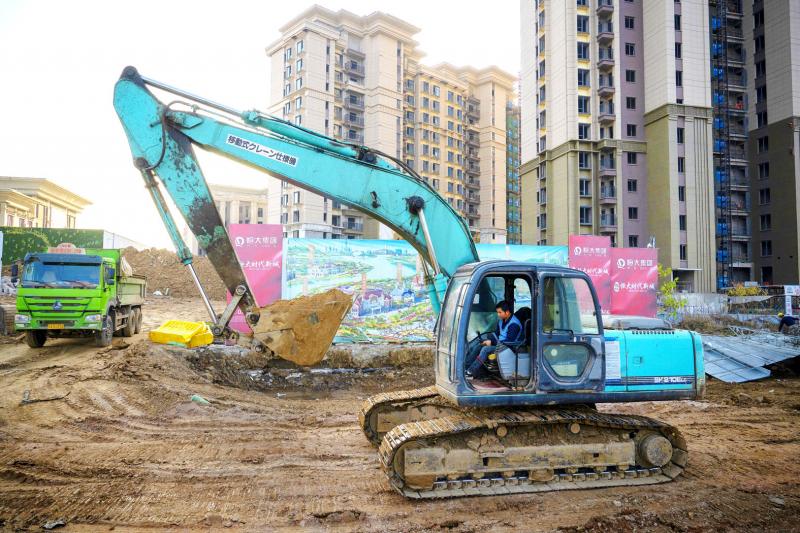China Evergrande Group (恆大集團) would deliver almost four times as many housing units to buyers this month as it had in the previous three months, chairman Xu Jiayin (許家印), or Hui Ka Yan in Cantonese, said, as the real-estate behemoth grapples with massive debts.
Evergrande — drowning in US$300 billion in liabilities — has struggled to repay bondholders and investors after becoming ensnared in Beijing’s deleveraging crackdown on the bloated property sector.
However, the group — which officially defaulted on a major bond payment this month — has said it would be able to complete tens of thousands of units and pay off some debts.

Photo: Bloomberg
“Since the company’s troubles began, we delivered fewer than 10,000 units in September, October and November,” Xu told a company meeting on Sunday evening, according to a post on Evergrande’s WeChat account.
“There are only five days left this month. We must charge full steam ahead to guarantee the delivery of 39,000 units this month,” he said.
The new homes are across 115 developments, he added.
“Absolutely nobody at Evergrande is allowed to ‘lie flat,’” Xu said, referring to an Internet slang term for “slacking off” popular among young people.
In the past few months, the company has repeatedly said it would finish its unfinished projects and deliver them to buyers in a desperate bid to salvage its debts, despite having missed a payment of more than US$1.2 billion earlier this month. Earlier struggles to pay suppliers and contractors due to the debt crisis led to sustained protests from homebuyers and investors at the group’s Shenzhen headquarters in September.
Since then, the bloated firm has tried to sell off its assets and shave down its stakes in other firms, with Xu paying off some of the debts using his own considerable personal wealth.
The provincial government of Guangdong — where the firm is headquartered — is overseeing Evergrande’s debt restructuring process, but Beijing has yet to roll back any of the restrictions that prompted the housing crunch.
Having already blamed the firm’s woes on “poor management and blind expansion,” China’s central bank on Saturday vowed to protect the rights of home buyers and promote the healthy development of the real-estate market.

KEEPING UP: The acquisition of a cleanroom in Taiwan would enable Micron to increase production in a market where demand continues to outpace supply, a Micron official said Micron Technology Inc has signed a letter of intent to buy a fabrication site in Taiwan from Powerchip Semiconductor Manufacturing Corp (力積電) for US$1.8 billion to expand its production of memory chips. Micron would take control of the P5 site in Miaoli County’s Tongluo Township (銅鑼) and plans to ramp up DRAM production in phases after the transaction closes in the second quarter, the company said in a statement on Saturday. The acquisition includes an existing 12 inch fab cleanroom of 27,871m2 and would further position Micron to address growing global demand for memory solutions, the company said. Micron expects the transaction to

Nvidia Corp’s GB300 platform is expected to account for 70 to 80 percent of global artificial intelligence (AI) server rack shipments this year, while adoption of its next-generation Vera Rubin 200 platform is to gradually gain momentum after the third quarter of the year, TrendForce Corp (集邦科技) said. Servers based on Nvidia’s GB300 chips entered mass production last quarter and they are expected to become the mainstay models for Taiwanese server manufacturers this year, Trendforce analyst Frank Kung (龔明德) said in an interview. This year is expected to be a breakout year for AI servers based on a variety of chips, as

Global semiconductor stocks advanced yesterday, as comments by Nvidia Corp chief executive officer Jensen Huang (黃仁勳) at Davos, Switzerland, helped reinforce investor enthusiasm for artificial intelligence (AI). Samsung Electronics Co gained as much as 5 percent to an all-time high, helping drive South Korea’s benchmark KOSPI above 5,000 for the first time. That came after the Philadelphia Semiconductor Index rose more than 3 percent to a fresh record on Wednesday, with a boost from Nvidia. The gains came amid broad risk-on trade after US President Donald Trump withdrew his threat of tariffs on some European nations over backing for Greenland. Huang further

HSBC Bank Taiwan Ltd (匯豐台灣商銀) and the Taiwan High Prosecutors Office recently signed a memorandum of understanding (MOU) to enhance cooperation on the suspicious transaction analysis mechanism. This landmark agreement makes HSBC the first foreign bank in Taiwan to establish such a partnership with the High Prosecutors Office, underscoring its commitment to active anti-fraud initiatives, financial inclusion, and the “Treating Customers Fairly” principle. Through this deep public-private collaboration, both parties aim to co-create a secure financial ecosystem via early warning detection and precise fraud prevention technologies. At the signing ceremony, HSBC Taiwan CEO and head of banking Adam Chen (陳志堅)